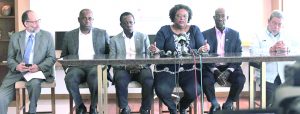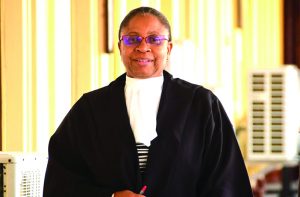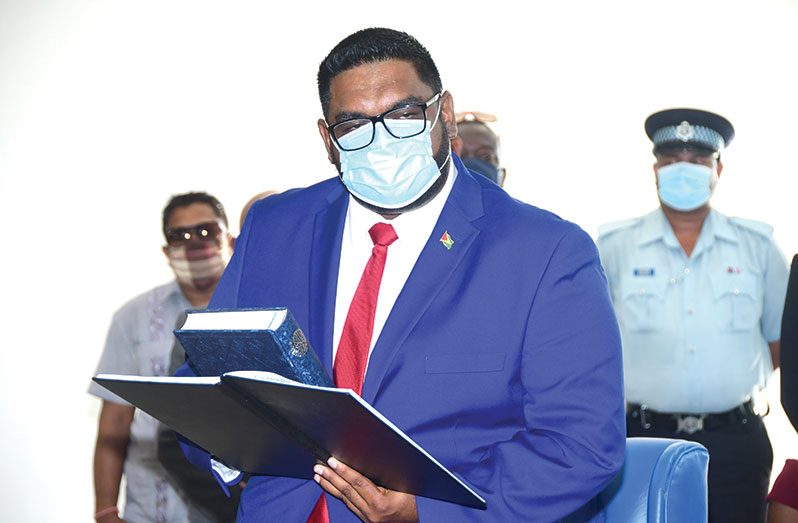* IN November 2018, then Parliamentary Opposition, the People’s Progressive Party/Civic (PPP/C), filed a motion of No-Confidence against the coalition government, citing massive corruption and an unemployment crisis.
* On December 21, 2018, former Alliance for Change (AFC) back-bencher, Charrandass Persaud, voted in favour of the Opposition-sponsored motion against his government, toppling what would become a one-term Presidency for Brigadier (ret’d) David Granger. Persaud maintained that it was a vote of conscience.
* That night, former Prime Minister, Moses Nagamootoo, led all the Government MPs, with the exception of Persaud, into an emergency meeting, where it was agreed that the debate on the motion was an open and transparent one and it must be recorded in Parliamentary democracy. At an urgent press conference that night, the Prime Minister conceded that the APNU+AFC government was toppled by the motion.

* The successful passage of the motion activated a section in the constitution which stipulated the need for fresh elections within three months. But this did not happen
* On Christmas Eve, 2018, an interpretation for what constituted an “Absolute Majority” in the National Assembly was floated and later adopted by the coalition. The coalition argued that the PPP/C needed not one, but two extra votes for the motion to be successfully passed. The coalition proffered that half of 65 was 32.5, but since there could be no half vote, the figure would be rounded to 33; and, an absolute majority could only be garnered from 34 votes or more
* From this point forward, a lengthy legal battle ensued and began at the High Court, where the Chief Justice (ag), Roxane George, ruled that the motion was validly passed. A dissatisfied APNU+AFC engaged the Court of Appeal and then the final appeal went to the Caribbean Court of Justice (CCJ), Guyana’s apex court
* On July 18, 2019, the CCJ ruled that the No-Confidence motion was successfully passed and 33 was indeed the majority of 65. Charrandass’ dual citizenship status was also legally challenged, but the courts ruled that this did not affect his vote in favour of the motion

* Elections were further delayed over the selection of the Chairperson of the Guyana Elections Commission (GECOM) when former President David Granger, unilaterally appointed Justice (ret’d) James Patterson. The PPP/C challenged his appointment all the way to the CCJ; the CCJ ruled that Mr. Granger did not have the power to make the unilateral appointment and so, Patterson had to vacate the office
* After many months of exchanging lists on a suitable candidate, Mr Granger and Mr Jagdeo finally agreed to appoint Justice (ret’d) Claudette Singh as the Chairperson, but GECOM then had to deal with the cleansing of the voters’ list and house-to-house registration. Probes into fake certificates and concerns were conducted as GECOM began preparations for the polls
* By the end of September, March 2, 2020, was fixed as the date for Regional and General elections. This meant that the Regional and General Elections would be held more than a year after the No-Confidence motion was passed, and just a few months shy of when elections were initially, constitutionally due. On December 30, 2019 Parliament was finally dissolved
* Dr. Irfaan Ali, 40, a former Housing Minister was selected as the presidential candidate for the PPP/C on January 19, 2019
* On March 2, just about a week after Guyana commemorated its 50th Republic Anniversary, citizens went to the polls. At the end of that day, the elections were hailed as “free, fair and transparent”
* Before the next morning, the PPP/C completed its internal tabulations using their Statements of Poll (SOPs) from 2,339 polling stations. Throughout the official tabulation, the figures matched the SOPs and the party was poised to win the elections after the tabulation of Guyana’s largest voting region- Region Four. It seemed as though it would take a miracle for the APNU+AFC coalition to return to government.
* Clairmont Mingo, the Returning Officer for Region Four fell ill, stalling the tabulation of the region. His replacement also fell ill, and before long, it was night and the tabulation was stalled until the next morning. When the tabulation resumed, figures that did not match the SOPs secured by the PPP/C, were called out by GECOM; these inflated the votes garnered by the coalition and showed them coming back from certain defeat
* After a thinly-veiled threat to revoke accreditation and one bomb scare later, Mingo read out the figures which indicated a coalition victory, and another one-seat majority in the National Assembly.
* Immediately, an injunction, supported by the PPP/C was filed, blocking the swearing in of President Granger for his second term. This began the second round of court action. Chief Justice George annulled the results of Region Four and ruled that a partial recount should take place, verifying the results of the contentious region
* This recount, dubbed the Spreadsheet edition, saw the tabulation resuming in the presence of party agents and observers. The twist was that Mingo read results directly from a spreadsheet, which did not match the SOPs gathered by the other parties. Something seemed amiss * The International Community made it clear that the Mingo’s results were not credible and would not be accepted. And Chairperson of the Caribbean Community (CARICOM) and Prime Minister of Barbados, Mia Mottley came to Guyana with a team of CARICOM Ministers in an attempt to mediate between Mr Jagdeo and Mr Granger. This is when the agreement for a full recount of all votes cast in all ten regions was reached between the PPP/C and the APNU+AFC. But then, Guyana started to record cases of the deadly COVID-19 * This recount, though demanding patience from all parties, was seen as a credible solution to the entire process, as claims of irregularities emerged in other regions. A private citizen, Ulita Grace Moore, was not pleased though; she filed for an injunction (yes, another injunction) blocking the national recount. As this matter engaged the judicial system, time passed by. And while the rest of the world battled COVID-19, Guyana was dealing with an electoral epidemic within the pandemic
* About two months later, on May 6, the national recount finally got underway, with COVID-19 precautions in place. CARICOM sent a three-member team to scrutinise the recount. But as the 34-day recount went on, claims of dead voters, migrant voters and electoral fraud were highlighted by the coalition, but there was nothing substantial to invalidate the elections. A month later, the recount was completed and yes, it showed a PPP/C victory * However, the Chief Elections Officer (CEO), Keith Lowenfield, in his first elections report, stated that he could not determine the credibility of all votes. As such, he invalidated thousands of votes, giving the APNU+AFC a victory. Another private citizen, Eslyn David challenged the credibility of the recount. It was back into the courts again – albeit COVID-19 style – while “fresh elections” became the new clamour * On June 22, 2020, the CCJ invalidated Lowenfield’s move to discard votes, and elucidated what constituted a “valid” vote. There was no other conceivable avenue that could be pursued to stall the swearing in of the PPP/C Presidential candidate yet, Lowenfield found one.
He either submitted the incorrect elections report (that is, not based on the national recount) or just outrightly did not submit a report to GECOM so that a winner could have been declared. Somewhere in between visa sanctions, growing tensions and ever-increasing COVID-19 cases, Misenga Jones approached the courts aiming to deter the swearing in of a PPP/C government. The phrase “Res Judicata” was introduced; it meant that matters that were already adjudicated may not be pursued further by the same parties
* The Court of Appeal then ruled on Jones’ petition and determined the recount was legitimate and should be used to declare the winner of the elections. Furthermore, it was highlighted that the CEO’s actions should not stall the declaration any longer as he was not a “lone ranger” * The declaration of Irfaan Ali as the ninth Executive President of Guyana and his swearing in happened in one swift motion on August 2, following more than a year of delays manifested by the APNU+AFC coalition.
* Subsequently, Chairperson of the People’s National Congress Reform (PNCR), Volda Lawrence; Chief Elections Officer, Keith Lowenfield; Region Four Returning Officer, Clairmont Mingo, APNU+AFC activist from Region Five, Carol Joseph; Deputy Chief Elections Officer, Roxanne Myers, were all charged with electoral fraud. Their cases are still pending in the courts.



.jpg)










